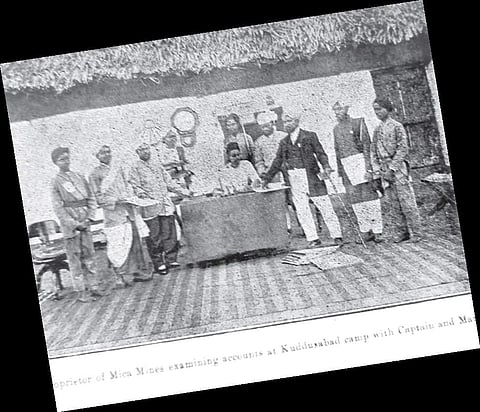

CHENNAI: The trade, commerce, politics, and history of south India have been shaped by several powerful individuals and families. Among the names that made it to the list, the Badsha family — members of the Urdu Muslim mercantile elite — were one of the leaders in extending business relationships to places like Arabia, Egypt and Japan.
In a tete-a-tete with the fourth-generation descendants, Faiz Badsha Sayeed and Faud Badsha Sayeed, we find out more about perhaps one of the oldest families to establish a strong base in Triplicane, their life in the Madras Presidency and their omnipresence in south Indian history.
The family took root when Haji Mohammed Badsha Sahib earned a fortune by exporting indigo to Britain. “He was an ordinary man and used to work in the port. He got lucky when a piece of indigo cloth fetched him a fortune from Britain and he gradually began selling more,” says 66-year-old Faiz, the great grandson of Haji.
By 1819, Haji Mohammed Badsha Sahib established their family firm — a textile company, Messrs H Mohammed Badsha Sahib & Co. By the early 20th century, the family also became leading importers of Manchester cotton goods and exported indigo, tamarind, mica and Madras cotton piece goods to Britain. “He was one of the richest businessmen in South…he was also giving and god fearing. If we, his great-grandchildren are doing well in life, I believe it is because of all the good deeds our ancestors did,” he said, adding that his great-grandfather, was also known as ‘Mallikutujar’, the head of merchants.
He hands us a picture of a man clad in a tunic and turban, and says, “That’s our grandfather, MA Khuddus Badsha Sahib, the seventh son of Haji Mohammed Badsha. My grandfather and his brother Abdul Azeez Badsha Sahib, were born in the building located in Vallabha Agraharam Street — the Broadlands lodging house which was previously the Turkish Consulate in Madras. Our great grandfather built it in the 1800s,” shares Faiz with a child-like enthusiasm.
After H Mohammed Badsha Sahib’s retirement in the early 1870s, his sons took over his business. The duo, Abdul Azeez Badsha and Khuddus Badsha, served as the Consul and Vice-Consul at the Turkish Consulate in Madras and were popularly known as the ‘Badsha brothers’ and epitomised leadership. “My grandfather purchased the area constituting Triplicane-Wallajah Road, Khas Mahal – ‘The Old palaces of Nawabs’ while Abdul Azeez Badsha Sahib purchased the entire Gemini complex. Some of the fourth-generation descendants still live in and around the area,” he says.
Faiz shares that Khuddus Badhsa owned a piece of land in Mecca. “Unlike Azeez Badsha, my grandfather never performed the Haj but, he sent my grandmother along with my father to perform the Haj. After they returned, she fell ill and requested my grandfather to build a tap in the zamzam well in Mecca. After a lot of back and forth through telegrams, the tap was finally built and shortly after that, my grandmother passed away. That was probably her last wish,” he says.
He hands us a sheet which reads, ‘No more loyal subject of the King-Emperor or more respected Member of the Mohammadan Community will be the guest of the Madras government at Delhi for the Imperial Coronation Durbar’. “Our grandfather was invited to the Imperial Durbar between the late 19th century and early 20th century. He, along with his brother, actively took part in several organisations and they were philanthropists,” he says. The Government of India even conferred Azeez Badsha Sahib with the title of ‘Khan Bahadur’ in recognition of his public services.
From being the trustee of the Madras Port Trust, vice-president of the South Indian Chamber of Commerce to the vice-president of the South Indian Athletics Association, Khuddus Badsha wore many hats. “He was also one of the founders of the Indian bank,” shares Faud.
Khuddus Badsha bought thousands of acres of land across the south. While some were turned to cultivation lands or passed on to the next generation, most are under court litigation. “After land reforms and the abolition of zamindari system, a huge portion of the land was taken by the government,” he says.
Over the years, the descendants have shown little evidence of their past glory, living a simple and unassuming life. “My father and his siblings took to other professions.
He was a doctor and one of his siblings was a barrister, who was tutored by Dr Radhakrishnan! We have our daily jobs and live a normal yet happy life. We have learned to work hard and be giving, especially towards those who are less privileged,” shares Faiz.
Mica business
Khuddus Badsha possessed several ‘Shrotriems’, ‘Jaghris’, diamond mines and was a pioneer in the mica industry. He owned mines in Pinnamitta, Chennur and Khuddusabad, a village in Nellore district named after him. “Mica exhibitions were curated, and he also ran a Mica showroom in Triplicane. The Wallajah Mosque compound is where the factory/mica workshop manufactured mica daily basis. We even found bits of Mica in the house’s well,” shares Faiz.